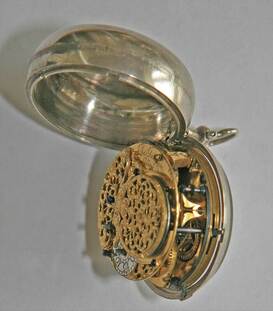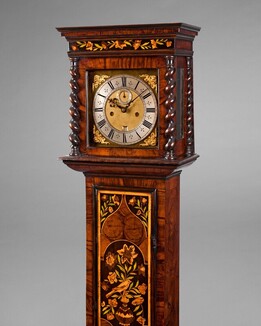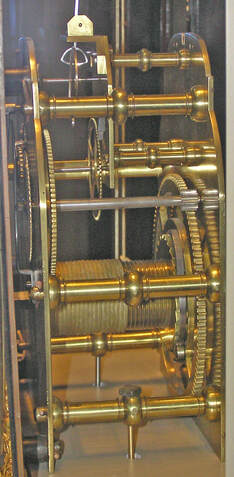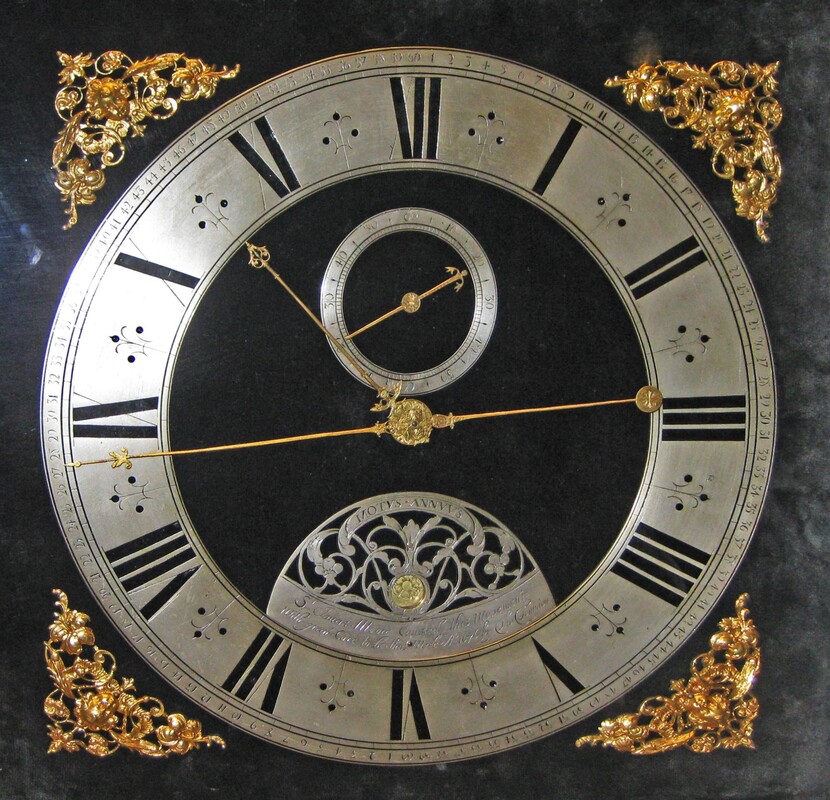Some of the leading experts in the field of horology have questioned the statement I made in my new book that Tompion could have been trained in the Blacksmiths’ Company. We know very little about his early life, his childhood and his training. There was an interesting obituary in the Diary of Thomas Hearn dated 27 Nov 1713. “Mr Tompion of London, one of the most eminent persons for making clocks and watches that have been produced in the last age dyed last week. Indeed he was the most famous and most skillfull person at this art in the whole world, and first of all brought watches to anything of perfection. He was originally a blacksmith but a gentleman imploying him to mend his clock, he did it extraordinarily well, and told the gentleman that he believed he could make such another himself. Accordingly he did so, and this was his first beginning, he living then in Buckinghamshire. He afterwards got a great name, lived in London, was acquainted with the famous Dr. Hooke, grew rich, and lived to a great age. He had a strange working head, and was well seen in mathematics.”  This is an interesting synopsis of Tompion’s life. He would have been trained by his father, at an early age, in the art of blacksmithing, as his father had been taught by his father, and by the normal age for apprenticeship, 14 years, he would have been fully trained as a blacksmith. Thomas junior, unlike his father, must have decided he wanted to be more than just a village blacksmith, so then embarked on a different career, leaving Ickwell Green and binding himself to a clock or watchmaker. Several different masters have been suggested for Tompion but none of the writers explain satisfactorily why early in 1671 Thomas was able set up his workshop inside the City limits (in Water Lane), indicating he had been trained in one of the London Companies. Otherwise he risked being fined and his tools confiscated as a non-freeman of a City Company. (See blog post about training in a London Guild) Jeremy Evans has suggested that Tompion may have been trained by Ahasaurus Fromanteel, based on the information he wrote in a letter to the CC when they told Fromanteel to get rid of his journeyman who “had served only 5 years to a smith in the country”. Fromanteel could still have had the services of the journeyman if he had passed him over to his brother-in-law Andrew Prime (a freeman of the BC who worked with Fromanteel) to finish the remainder of his 7 years training in the BC. The Clockmakers’ Company (CC) records do offer a clue to this conundrum. When they enrolled Thomas Tompion as a free brother of the Company on the 4th Sept 1671 he was described as a “great clockmaker”. On the same day the Company also enrolled as a free brother and a “great clockmaker” Thomas Grimes who was definitely a freeman of the BC having been freed in 1668. So was Tompion free of the BC too? In 1636 The CC had signed an agreement with the BC not to enrol any “great clockmakers of iron [clocks]” but they would only enrol watchmakers and makers of domestic clocks. After the Great Fire of London in 1666 the CC enrolled a number of “great clockmakers”. They concealed the fact that Thomas Grimes was a freeman of the BC. Daniel Quare was enrolled on 3 Apr 1671; Joseph Windmills was enrolled on 29th Sept 1671 and Christopher Gould on 3rd Apr 1682 who were all described as great clockmakers too.  It is interesting when they enrolled Joseph Knibb on 16th Jan 1670/71 as a free brother the CC did NOT describe him as a “great clockmaker” but we know that he had worked in Oxford as a great clockmaker and made a number of great clocks of iron in that area about 1670. Brian Loomes has suggested that Joseph Knibb may have been trained by his cousin Samuel Knibb at Newport Pagnell, so this could be the reason why he was not called a great clockmaker by the CC. There was no need to call him a great clockmaker to conceal the fact that he was free of another company because he had been trained outside London. It seems to be an unusual coincidence that Thomas Grimes was made a brother in the CC on the same day as Thomas Tompion and his longcase clocks resemble those made by Tompion, perhaps they used the same casemaker( as did other makers) (see longcase clock by Thomas Grimes Figs 1) or was there a closer connection between the two?  Thomas Grimes did not live long enough to become one of the leading clockmakers by 1697 because he died in 1682 and his business was taken over by his journeyman and cousin, William Grimes who had been freed by the BC in 1663 and joined the CC on 3 Jul 1682 as a free brother. There was no need for the CC to call him a great clockmaker and disguise the fact that he too was a freeman of the BC because he had worked for his cousin Thomas as ‘a journeyman’ when the latter joined the CC. In 1674 Thomas Tompion made a quadrant for Robert Hooke who was so pleased with it he recommended Tompion for other commissions. From this time on Tompion’s work was wanted by the King and all the gentry, so he never looked back, becoming rich as well as famous. In 1676 Tompion moved into larger premises on the corner of Water Lane and Fleet Street, thus moving from the parish of St Bride to St Dunstan’s. He may also have retained his old premises because by 1677 John Gray, freed by the BC in 1673, had moved into them and may have worked for Tompion. Later William Baldwin (son of Michael and grandson of William), freed by the BC in 1685, was working in Tompion’s old premises by 1694 as a clockmaker. There seems little doubt that Thomas Tompion relied heavily on the men trained in the BC for his business even if he had not originally been trained within the Company himself. John Dyde bound Benjamin Harris through the BC in 1670 but he was turned over to Thomas Tompion in 1677 and freed by the BC in 1679. Benjamin Harris bound an apprentice, Joseph Audley in 1680 through the BC who was presented by Thomas Tompion through the CC in 1683. Harris was probably still working for Tompion after he had been freed by the BC. Thomas Dyde bound Charles Murray through the BC in 1680 and he was turned over to Tompion in 1686. This information leads one to believe that Thomas Tompion had a close connection with the BC and used clockmakers trained in the company for his business. There seems to be little doubt that Tompion was one of the leading clockmakers at the end of 17th century and certainly the most famous clockmaker of his time. His clocks are still sort after today and highly prized by collectors. William Clement had been apprenticed in the BC to Thomas Chapman, a clockmaker, in 1657 and freed by the company in 1664. After years of pressure by the CC he finally agreed to join that company in 1677 as a free brother but still remained a member of the BC. He was made an assistant of the CC in less than a year, a warden in 1690 and master of the CC in 1694. At the same time William was advancing up the hierarchy in the BC and had been made an assistant by 1687 and was elected as a warden of the company in 1697. So that when the BC announced in 1697 that all the leading clockmakers were former smiths (members of the BC) William Clement would have been certain to know who had been members of the BC and who the leading clockmakers were and would have disputed the company’s claim had it not been true. He was definitely one of the leading clockmakers in 1697. (See blog post: "The William Clement Clock at Middle Temple" )
0 Comments
|
AuthorKeith Bates is an amateur horologist who has been researching clocks, watches and chronometers and their makers for over 30 years. Archives
August 2023
Categories
All
|


 RSS Feed
RSS Feed